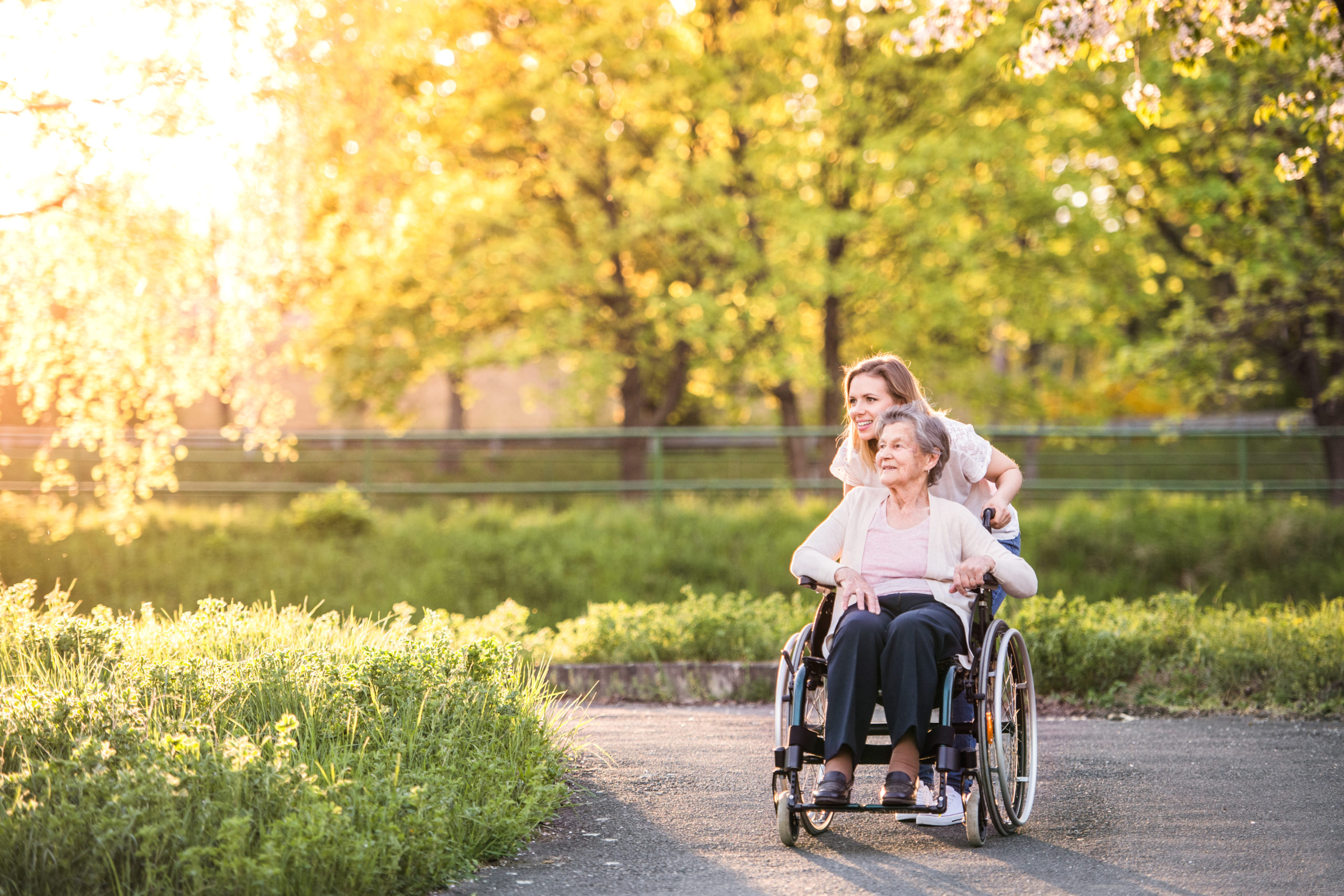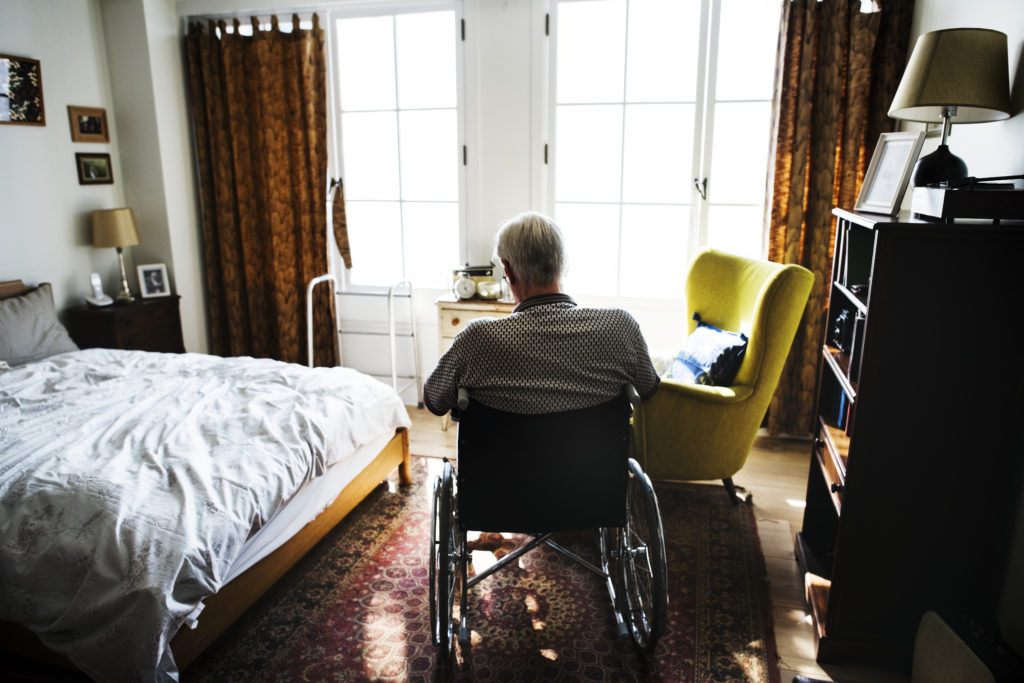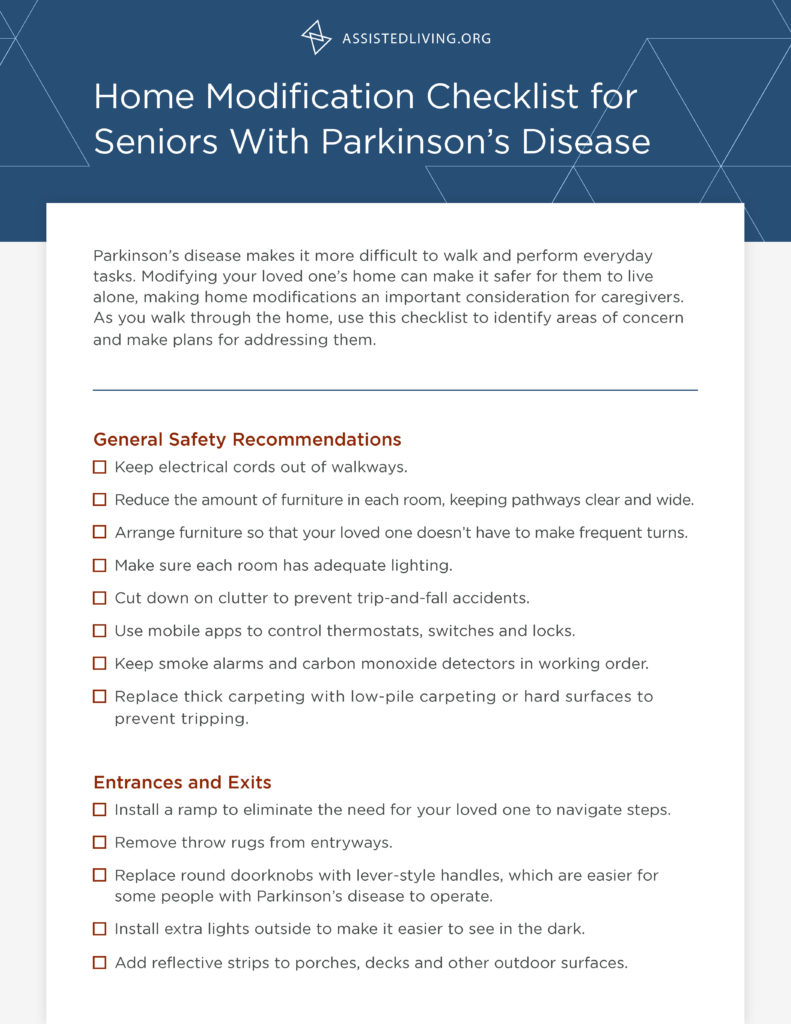Find Assisted Living in Your Area

A new diagnosis naturally leads to questions about your senior loved one’s situation, including whether their condition will affect their quality of life or their ability to live independently. This is especially true for those diagnosed with Parkinson’s disease since neurological disorders can have a significant impact on a senior’s ability to live safely in their home.
Parkinson’s disease may lead to dementia, a loss of thinking and reasoning that can make certain activities difficult or impossible. If your loved one develops dementia, you may need to make home modifications or create a safer routine for them. Adapting to these changes can be difficult, but adaptation ultimately reduces stress on you and improves the quality of life for them.
We created this guide to help you prioritize home safety modifications for seniors with Parkinson’s disease. Additionally, we delve into what you should look for if home modifications prove insufficient to improve your situation and a senior living community becomes your only option.
Room-by-Room Home Modifications for Seniors With Parkinson's Disease
Before making home modifications, conduct a thorough assessment to determine how you can make the senior’s home less hazardous. The checklist below is designed to help you identify potential safety issues in each room. Print out a copy and keep it with you as you walk through the home.
Home Safety Considerations for Seniors With Parkinson's Disease
Parkinson’s disease affects balance and coordination, increasing the person’s risk of falling. Between 45% and 68% of people diagnosed with Parkinson’s sustain falls each year, which can lead to broken bones, head injuries, or worse. Cluttered living spaces become more dangerous as a result, as the person struggles to walk through them without tripping or knocking things over. The uncontrollable movement or “shaking” associated with Parkinson’s can also make it more difficult to cook or drive safely.
Thankfully, home modifications can mitigate these risks. Consider these modification categories when assessing your loved one’s home.
Lighting
In some people, Parkinson’s disease causes blurry vision, double vision, and other vision problems. Though you may not be able to cure these symptoms, lighting modifications could make it easier for your loved one to get around. Use table or floor lamps in rooms with dim overhead lighting. Consider adding LED lights to the insides of kitchen cabinets or the rims above countertops to make it easier for them to complete daily tasks.
For seniors who use walkers or wheelchairs, adding light-switch extenders in each room could also make it possible to reach the lights without standing up, which may reduce their risk of falling. If necessary, you can also add longer cords or chains to overhead lights that aren’t on a switch.
Flooring
Parkinsonian gait is a common symptom of Parkinson’s disease. People with this symptom may shuffle their feet when they walk or freeze before taking a step. Your loved one may also maintain a stooped position, making it even more difficult to navigate through each room. One way to reduce the risk of falls is to replace thick carpets with thinner versions or even hard flooring. Deep-pile carpet more easily trips those who shuffle their feet when they walk. Additionally, walkers and wheelchairs are more difficult to maneuver on thicker carpets.
Furniture
Depending on how the disorder progresses, you may want to replace some of your loved one’s furniture to make it easier for them to get up and down without falling. For example, you may want to add a lift chair recliner to the living room. This type of chair is commonly used for sleeping as the disease progresses due to the added comfort and positioning it can provide. It has an internal motor to lift it up and down, making it easier for an older person with Parkinson’s disease or another neurological disorder to get in and out of the chair.
Tripping Hazards
Tripping hazards can also cause falls. Take a look around your loved one’s living space to see if any of the following tripping hazards are present:
- Electrical cords stretched across walkways
- Loose carpeting
- Area rugs
- Broken or loose tiles
- Clutter in walkways
- Furniture sticking out into walkways
- Too much furniture in a room
What To Look For in a Senior Living Community for a Loved One With Parkinson’s

If you and your loved one decide that their needs would be better served in a senior living community, it’s important to choose one that offers specialized care for residents with Parkinson’s disease. Here’s what to look for:
- Specialists Available: If a community doesn’t have access to a neurologist for consultations, it should at least make it easy for residents to acquire expert neurology care when needed. It’s also helpful if the community offers convenient access to an imaging center or hospital in case a resident’s symptoms get worse.
- 24-Hour Supervision: Your loved one may not need someone in their living quarters at all times, but it’s important to have a trained staff member available 24 hours per day. Staff members may provide help with activities of daily living, administer physical or occupational therapy, arrange for off-site medical care, or perform other functions to keep your loved one safe.
- Experienced Caregivers: The best programs have experienced staff members available to supervise residents and manage their care. Some senior living communities provide training specific to Parkinson’s disease to help employees better assist residents with this condition as well as quickly recognize the signs of disease progression.
- Medication Management: Medication management is especially important for seniors with Parkinson’s disease, as delays have been shown to result in “an immediate increase in symptoms.” Late administration of medications can cause confusion, loss of balance, worsening tremors, and difficulty communicating. Senior living communities that prioritize on-time medication administration are safer for residents with Parkinson’s than those that have frequent medication delays.
- Personalized Care Plans: No two people with Parkinson’s disease have exactly the same symptoms. Symptoms vary in frequency and severity, making personalized care essential for slowing disease progression. Individualized care may also make it easier for staff members to notice when a resident’s symptoms are getting worse.
Senior Living Facilities That Offer Parkinson's Management and Care
Assisted Living communities have staff members available 24 hours per day to offer a wide range of services and amenities to promote health and independence, making them a good fit for many people with Parkinson’s disease. Some communities even offer specialized care programs tailored to those with Parkinson’s, giving residents the extra support they need to manage their symptoms and preserve as much neurological function as possible.
The table below provides examples of assisted living communities that offer programs specifically for seniors with Parkinson’s disease.
| Community | Location | Description |
| Agape Villa Care Home
|
Roseville, CA | Agape Villa Care Home offers a full-service care program for seniors with Parkinson’s disease. Residents enjoy a home-like atmosphere and have access to regular social events, which can help reduce the risk of depression related to the condition. Staff members also provide assistance with eating, bathing, and other activities of daily living. |
| Fairview Rehab & Nursing Home | Queens, NY | At Fairview Rehab & Nursing Home, staff members aim to keep residents with Parkinson’s disease as active and healthy as possible. Each resident receives a personalized care plan to cope with the disease. The community also offers physical, occupational, and speech therapy along with dietary advice to reduce Parkinson’s symptoms. |
| Goddard House | Brookline, MA | Goddard House offers the Parkinson’s in Motion initiative, which takes a holistic approach to managing Parkinson’s disease. Staff members receive ongoing training on Parkinson’s and its effects, ensuring they understand how to provide high-quality care. Goddard also offers a variety of movement and expressive therapies for residents with Parkinson’s disease. |
| Parkinson’s Specialty Care Residential Living – East Bloomington | Bloomington, MN | Parkinson’s Specialty Care Residential Living – East Bloomington provides expert care for residents with Parkinson’s disease. Nurses receive training specific to Parkinson’s and movement disorders, enabling them to help residents manage their symptoms. The community has a home-like environment and offers many opportunities for residents to socialize. |
| Parkinson’s Specialty Care Residential Living – Edina East & West | Edina, MN | Parkinson’s Specialty Care Residential Living – Edina East & West accommodates six residents, ensuring that each person receives personalized attention. The assisted living home has large common areas to make it easy for family members to visit as often as possible. Residents also enjoy watching birds and other wildlife from the patio. |
| Parkinson’s Specialty Care Residential Living – Golden Valley | Golden Valley, MN | Parkinson’s Specialty Care Residential Living – Golden Valley offers a relaxed environment where residents with Parkinson’s disease can form lasting friendships. Staff members receive ongoing training in movement disorders, improving quality care for all residents. The home also has a deck and screened-in porch to encourage residents to socialize. |
| Parkinson’s Specialty Care Residential Living – Maplewood | Maplewood, MN | Parkinson’s Specialty Care Residential Living – Maplewood provides a quiet environment where residents can relax and enjoy life. The community’s model of care emphasizes on-time medication administration to make it easier for residents to manage their symptoms. Residents also have access to assistive devices designed for seniors with Parkinson’s disease. |
| Parkinson’s Specialty Care Residential Living – West Bloomington | Bloomington, MN | Parkinson’s Specialty Care Residential Living – West Bloomington accommodates six residents. The community features a pond, bird feeders, and planter gardens, giving residents opportunities to socialize and spend quality time outdoors. Staff members receive specialized training in the care of people with Parkinson’s disease and related movement disorders. |
| Redstone Village | Huntsville, AL | Redstone Village offers Rock Steady Boxing classes, which use a boxing-based fitness curriculum to help people with Parkinson’s disease improve their gait, posture, flexibility, and range of motion. Staff members also provide assistance with activities of daily living as needed. |
| Saint Simeon’s Senior Community | Tulsa, OK | Saint Simeon’s Senior Community has state-of-the-art equipment to help residents with Parkinson’s disease retain as much function as possible. The community’s Parkinson’s care program has been endorsed by the Parkinson Foundation of Oklahoma, giving residents and their loved ones extra peace of mind. |
| Senior Care Homes – Nantucket House | Overland Park, KS | Nantucket House has a licensed caregiver on the premises 24/7. Resident rooms and common areas have features that make the community safer for people with Parkinson’s disease, including grab bars, accessible showers, and hard flooring to reduce the risk of falls. Residents also have access to activities designed to help preserve cognitive function. |
| The Heritage of Overland Park | Overland Park, KS | The Heritage of Overland Park provides a wide range of support services for residents with Parkinson’s disease. These include medication management, memory care, assistance with ambulation, and a personal escort to meals and other activities. The Heritage also provides opportunities for physical and occupational therapy. |
| Ultimate Personal Care Homes | Houston, TX | Ultimate Personal Care Homes takes a person-centered approach to caring for residents with Parkinson’s disease. In addition to memory care, the community offers reminiscence therapy and other activities designed to preserve cognitive function and improve each resident’s quality of life. |
| Youville House Assisted Living | Cambridge, MA | Youville House offers the STEP program for residents with Parkinson’s disease. STEP stands for support, training, education, and physical movement. Participants have access to a Parkinson’s disease support group, a singing program to improve respiratory and motor function, a dedicated classroom, and an on-site dance program. |
For assistance choosing a community that offers specialized care for residents with Parkinson’s disease, contact a family advisor at (888) 307-1103.
Resources for Caregivers of Seniors With Parkinson's Disease

If your loved one was just diagnosed with Parkinson’s disease, it’s important to familiarize yourself with the symptoms and find out how to provide the best possible care. The table below includes resources to help you learn more about Parkinson’s and understand how to keep your loved one as healthy as possible as they live with the disorder.
| Resource | Contact Information | How It Can Help |
| Parkinson’s Foundation | (800) 473-4636 | The Parkinson’s Foundation offers educational resources to help caregivers learn more about the disease and find out how to provide physical and emotional support to their loved ones. It also raises money to fund research into treatments for Parkinson’s disease. |
| The Michael J. Fox Foundation for Parkinson’s Research | (212) 509-0995 | The Michael J. Fox Foundation offers a variety of resources for people living with Parkinson’s Disease and their caregivers. One helpful tool is “Navigating Parkinson’s: Your Guide to the Early Years,” which is a downloadable guide that includes tips for navigating medical appointments from the perspective of someone with a recent Parkinson’s disease diagnosis. |
| American Parkinson Disease Association | (800) 223-2732 | APDA has a nationwide network of resources to help people with Parkinson’s disease improve their quality of life. The organization also offers resources specifically for caregivers, including “Becoming a Care Partner,” a PDF guide to caring for someone with Parkinson’s disease. |
| Lotsa Helping Hands | [email protected] | Lotsa Helping Hands makes it easier for caregivers to establish support networks in their neighborhoods. The care calendar is especially helpful, as it allows family members and friends to sign up to provide transportation to medical appointments or respite care when needed. |
| National Institute of Neurological Disorders and Stroke | (800) 352-9424 | NINDS has a library of patient and caregiver resources, making it easier to understand how the nervous system works and what to expect when undergoing neurological tests and procedures. |
| Davis Phinney Foundation for Parkinson’s | (866) 358-0285 | The Davis Phinney Foundation for Parkinson’s maintains a list of recommended tools to provide better care for adults with Parkinson’s disease. The organization also funds research into using diet, exercise, and other interventions to improve quality of life and prevent disease progression. |
| CurePSP | (800) 457-4777 | CurePSP maintains a library of educational resources and has support groups throughout the United States. The organization also operates the Centers of Care program, which provides specialized care for people with Parkinson’s disease from 27 U.S. locations. |
| Parkinson’s Resource Organization | (877) 775-4111 | PRO works to ensure that people with Parkinson’s disease have the support they need to avoid isolation. Its website has a checklist of steps to follow after a new diagnosis. PRO also offers virtual meetings for people with Parkinson’s disease and their caregivers. |

